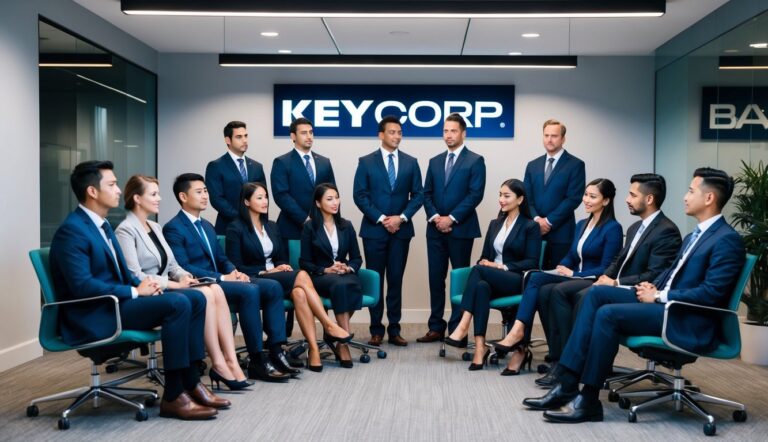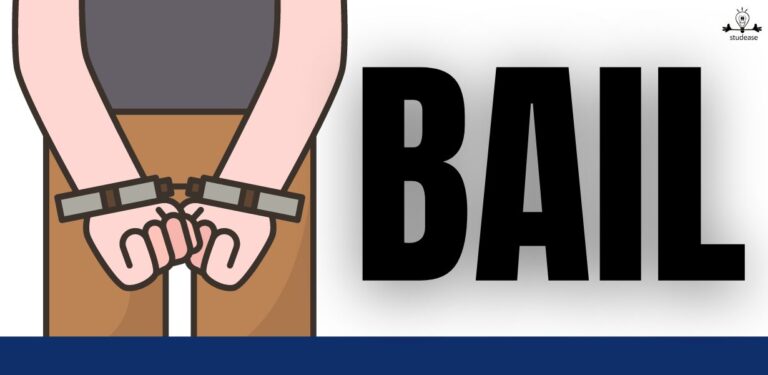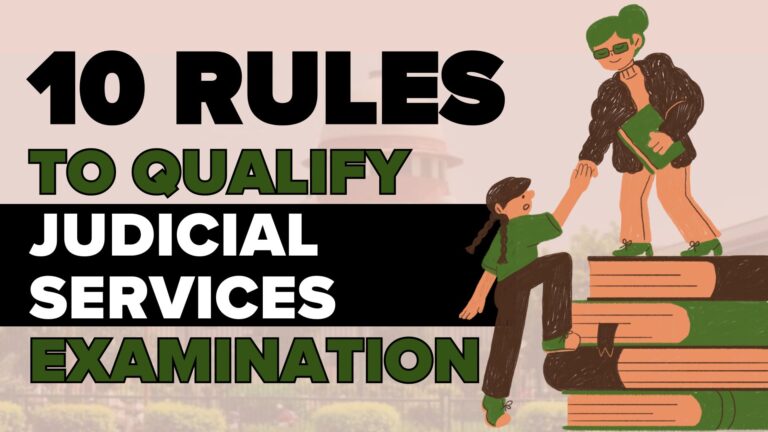110 Interview Questions Citigroup Bank: Essential Preparation Guide
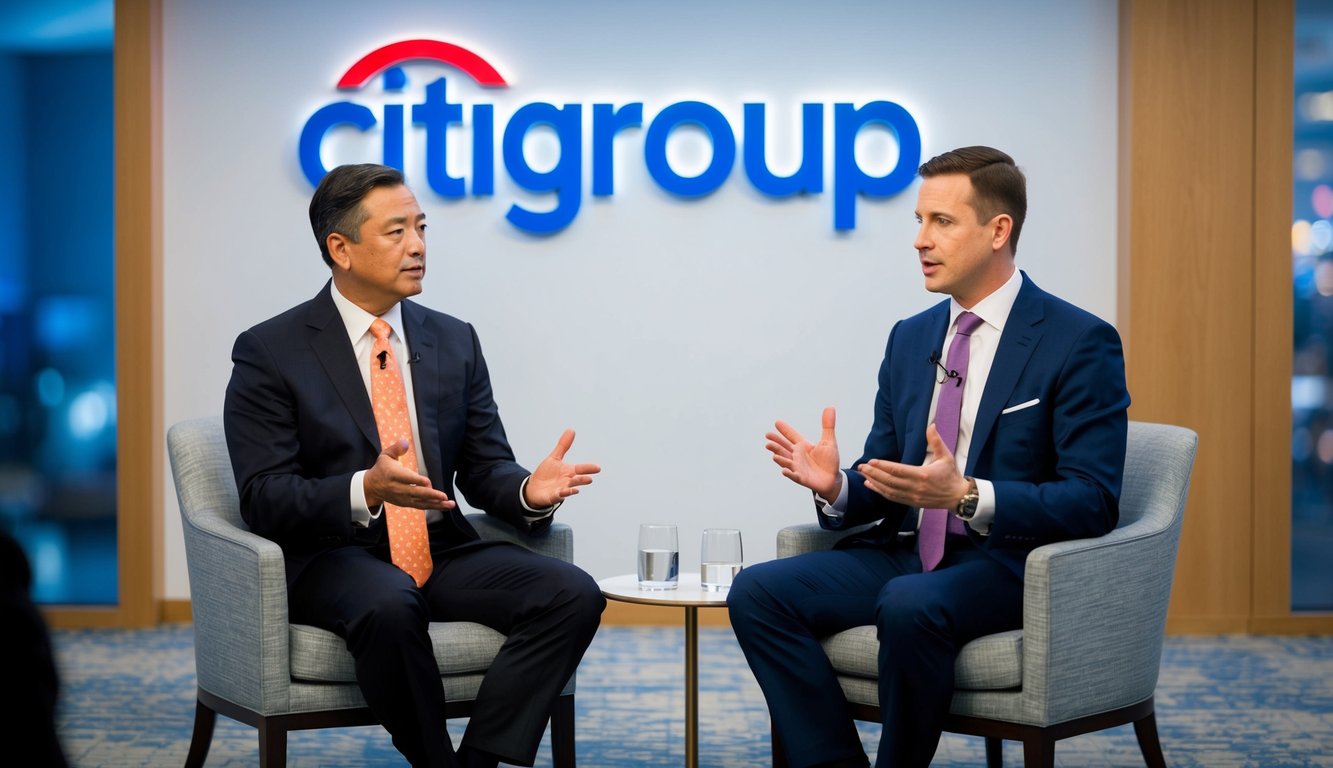
Navigating a job interview at Citigroup, and being prepared with the right questions can make all the difference. Understanding the types of questions often asked in Citigroup interviews can increase your confidence and improve your chances of success.
This post covers 110 Interview Questions for Citigroup Bank Interview.
Whether you’re applying for a finance, technology, or customer service position, having a grasp of potential questions is the key.
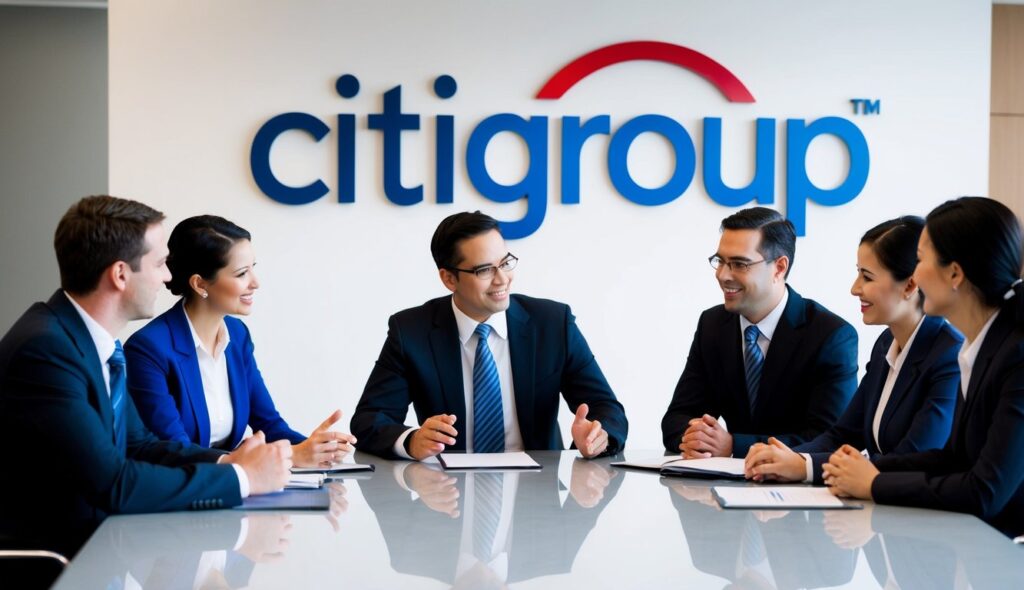
In this post, you’ll discover 110 common interview questions you might encounter when interviewing at Citigroup. They serve to assess your fit and how well you align with Citigroup’s corporate culture.
Preparing answers to these questions can greatly enhance your performance.
By anticipating what might be asked, you can tailor your responses to highlight your strengths, experiences, and knowledge. This approach not only helps in reducing anxiety but also ensures that you can present yourself as a strong candidate.
Understanding Citigroup

Citigroup is a leader in financial services, providing a wide range of banking products and services. This section explores its influential history, impact on the financial industry, and what it’s like to work within its company culture.
History and Impact in Financial Services
Citigroup, became a major player in the banking industry.
Its broad range of services includes retail banking, credit cards, and investment banking. Citigroup provides services in over 160 countries, impacting global financial markets considerably. This extensive reach contributes to its influence and innovation in the financial industry, setting standards and trends.
Citigroup’s Company Culture
Working at Citi means being part of a diverse and inclusive culture. It aims to create a supportive environment where people from different backgrounds can thrive.
Citigroup values development and offers numerous programs to advance your career. Emphasis is placed on ethics and responsibility, ensuring that employees act with integrity.
Innovation is encouraged, with teams often working on cutting-edge solutions. This culture helps Citigroup maintain a strong position in the competitive financial industry.
Preparing for Your Interview at Citigroup

Preparing for your interview at Citigroup involves understanding the job role, highlighting your skills, and effectively showcasing your experience. Addressing key interview areas like leadership and teamwork can significantly improve your chances.
Crafting the Perfect CV and Cover Letter
Step 1: Tailoring Content
Begin by tailoring your CV to match the job role, emphasizing relevant experience and skills. Include strong action verbs and quantifiable achievements to make your experience stand out.
Ensure your cover letter complements your CV, providing a cohesive narrative of your professional journey. Focus on why you are excited about the opportunity at Citigroup and what unique qualities you bring.
Step 2: Formatting
Organize sections using clear headers, bullet points, and a clean layout. Stick to a professional font and use consistent formatting.
Avoid clutter and keep both documents concise, preferably within one page each. Proofread to eliminate any typos or grammatical errors.
Understanding the Job Description
Step 1: Analyzing the Role
Study the job description carefully. Identify key responsibilities, skills, and qualifications required. Note any technical or industry-specific terms to understand what the role demands.
Highlight areas that match your expertise and prepare examples that demonstrate your competencies in those areas.
Step 2: Researching the Company
Learn about Citigroup’s values, recent projects, and industry standing. Visit their official website, review recent news, and explore LinkedIn profiles of current employees.
This information can be crucial during your interview when discussing how your goals align with the company.
Predicting and Practicing Common Interview Questions
Step 1: Common Questions
Prepare answers for standard questions you might face, such as “Tell me about yourself,” or “What are your strengths and weaknesses?”
Step 2: Citi-Specific Questions
Research potential Citigroup-specific questions. These may relate to financial markets, ethics, or teamwork. Practice your responses out loud, refining them for clarity.
Mock interviews with friends or mentors can provide additional feedback and build confidence.
Showcasing Leadership and Teamwork
Step 1: Leadership Examples
Detail past experiences where you led projects or teams. Use specific examples to highlight your ability to motivate others, make strategic decisions, and drive results.
Mention any challenges you faced and how you overcame them.
Step 2: Teamwork Skills
Emphasize situations where you worked effectively within a team. Focus on collaboration, conflict resolution, and communication skills.
Describe how your contributions helped the team achieve its goals, demonstrating your value as a collaborative and adaptable team player.
List of 110 Interview Questions Citigroup Bank
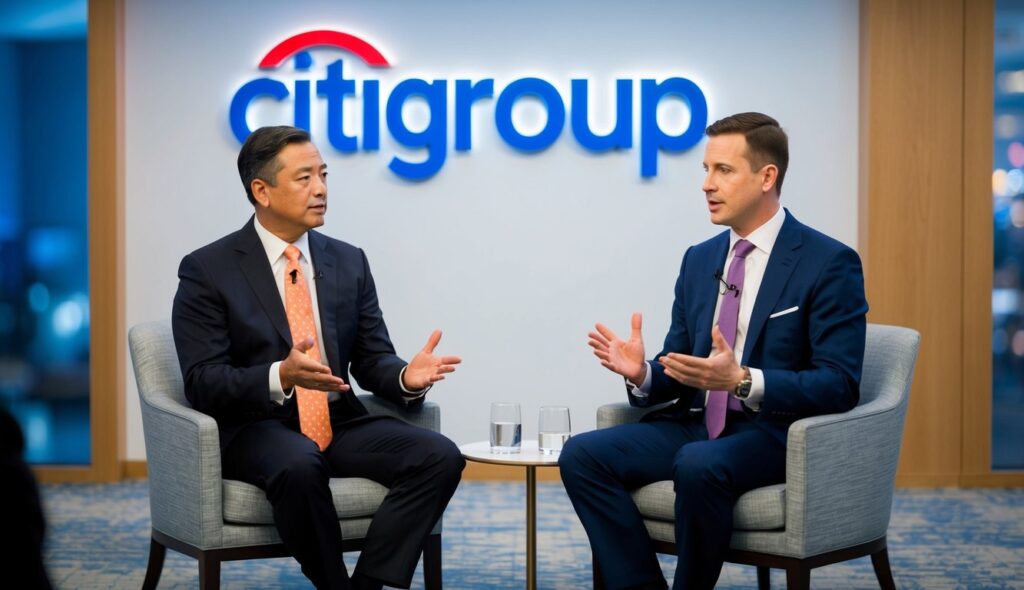
When preparing for an interview at Citigroup Bank, you should be ready to face a range of questions.
- Tell me about yourself.
- I have a degree in Finance from XYZ University and over three years of experience in the banking sector. I started my career as a financial analyst, where I developed strong analytical skills and a keen understanding of market trends.
- I am passionate about helping clients achieve their financial goals and am excited about the opportunity to work with Citigroup, known for its commitment to innovation and customer service.
- Why do you want to work at Citigroup?
- Citigroup’s global reach and diverse range of financial products are highly appealing to me. I admire the company’s commitment to sustainable finance and community development, which aligns with my values.
- I believe that my skills and experiences can contribute to Citigroup’s mission of providing excellent financial services.
- What do you know about Citigroup?
- Citigroup is one of the largest financial services organizations in the world, providing a wide range of services including investment banking, financial services, and wealth management.
- The company operates in over 100+ countries, serving millions of customers globally. I am particularly impressed by Citigroup’s initiatives in digital banking and its focus on innovation.
- Describe your understanding of our products and services.
- Citigroup offers a variety of products and services, including consumer banking, corporate banking, investment banking, and wealth management.
- The bank provides credit cards, loans, mortgages, and investment solutions tailored to meet the needs of individual and corporate clients.
- What are your strengths and weaknesses?
- One of my strengths is my analytical ability; I can quickly assess financial data and identify trends. A weakness I’m working on is my public speaking skills.
- While I am comfortable in small group settings, I am taking steps to improve my confidence when presenting to larger audiences.
- How do you handle stress and pressure?
- I handle stress by staying organized and prioritizing my tasks. When faced with tight deadlines, I break down my work into manageable steps and focus on one task at a time.
- I also find that taking short breaks helps me to recharge and maintain my productivity.
- Describe a challenging situation you faced at work and how you dealt with it.
- In my previous role, we faced a sudden increase in client inquiries during a market downturn. I coordinated with my team to develop a response strategy, ensuring that we communicated transparently with clients and addressed their concerns promptly.
- This proactive approach helped maintain client trust and satisfaction.
- Why did you choose a career in finance/banking?
- I have always been fascinated by how financial markets operate and how they impact the economy. I chose a career in banking because it allows me to combine my analytical skills with my passion for helping individuals and businesses manage their finances effectively.
- What are your long-term career goals?
- My long-term goal is to become a financial advisor, specializing in wealth management. I aim to build strong relationships with clients and help them achieve their financial objectives.
- I believe that working at Citigroup will provide me with the necessary experience and mentorship to reach this goal.
- How do you prioritize your work?
- I prioritize my work by assessing deadlines and the impact of each task. I use a task management tool to keep track of my responsibilities and ensure that I focus on high-priority items first. Regularly reviewing my progress helps me stay on track.
- Describe a time when you worked as part of a team.
- I was part of a project team tasked with developing a new financial product. We held regular brainstorming sessions to gather ideas and feedback.
- By collaborating effectively and leveraging each team member’s strengths, we successfully launched the product on time, which exceeded our sales targets.
- How do you handle conflicts with coworkers?
- I believe in addressing conflicts directly and respectfully. I try to understand the other person’s perspective and work towards a mutually beneficial solution.
- Open communication is the key, and I always aim to keep the conversation constructive.
- What do you think makes a successful banker?
- A successful banker needs to have strong analytical skills, excellent communication abilities, and a deep understanding of financial products.
- Building and maintaining client relationships is also crucial, as trust is a fundamental aspect of the banking industry.
- How do you stay updated with financial news and trends?
- I stay updated by reading financial news outlets, subscribing to industry newsletters, and participating in webinars and conferences. I also follow influential financial analysts on social media to gain insights into market developments.
- Can you explain the concept of risk management?
- Risk management involves identifying, assessing, and mitigating risks that could impact an organization’s financial health.
- It is crucial for banks to manage credit risk, market risk, and operational risk to ensure stability and protect client assets.
- Describe your experience with financial modeling.
- In my previous role, I developed financial models to project revenue and analyze investment opportunities. I used Excel extensively to create dynamic models that allowed for scenario analysis, which helped management make informed decisions.
- How do you ensure accuracy in your work?
- I ensure accuracy by double-checking my calculations and using systematic approaches to data entry. I also make it a habit to review my work and seek feedback from colleagues when necessary, as a fresh set of eyes can often catch errors.
- What is your experience with customer service?
- I have worked in customer service roles where I was responsible for addressing client inquiries and resolving issues.
- I prioritize understanding the client’s needs and providing timely solutions, which has helped me build strong relationships with customers.
- How do you approach problem-solving?
- I approach problem-solving by first identifying the root cause of the issue. I gather relevant data, brainstorm potential solutions, and evaluate the pros and cons of each option.
- I then implement the best solution and monitor the results to ensure effectiveness.
- Describe a time when you had to meet a tight deadline.
- I once had to prepare a financial report for a client meeting with only a few days’ notice. I organized my tasks, worked extra hours, and collaborated with my team to gather necessary information.
- We successfully delivered a comprehensive report on time, which impressed the client.
- What skills do you think are essential for this role?
- Essential skills include strong analytical abilities, excellent communication skills, attention to detail, and a solid understanding of financial products.
- Additionally, interpersonal skills are crucial for building client relationships.
- How do you handle constructive criticism?
- I view constructive criticism as an opportunity for growth. I listen carefully to the feedback, reflect on it, and take actionable steps to improve.
- I appreciate when others help me see areas where I can enhance my performance.
- What do you think about the current state of the banking industry?
- The banking industry is undergoing significant transformation due to advancements in technology and changing consumer behavior.
- Digital banking and fintech are reshaping how services are delivered, and I believe that adapting to these changes is crucial for future success.
- How would you explain a complex financial concept to a client?
- I would break down the concept into simpler terms and use relatable examples. Visual aids, like charts or graphs, can also help illustrate the idea.
- My goal would be to ensure that the client fully understands the concept and feels comfortable asking questions.
- What is your experience with compliance and regulations?
- In my previous role, I was involved in ensuring that our financial practices adhered to regulatory standards.
- I regularly reviewed compliance guidelines and participated in training sessions to stay informed about changes in regulations.
- How do you build relationships with clients?
- I build relationships by being attentive and responsive to clients’ needs. I make it a point to follow up regularly, provide valuable insights, and demonstrate genuine interest in their financial goals.
- Trust is the key to maintaining strong client relationships.
- Describe a time when you had to persuade someone to see your point of view.
- During a team meeting, I proposed a new strategy for client engagement. Some team members were hesitant, so I presented data supporting my approach and highlighted its potential benefits.
- After discussing their concerns, I was able to persuade them to adopt the strategy.
- What motivates you in your work?
- I am motivated by the opportunity to make a positive impact on clients’ lives. Seeing clients achieve their financial goals because of my efforts is incredibly rewarding.
- Additionally, I thrive in challenging environments where I can continuously learn and grow.
- How do you handle failure?
- I view failure as a learning opportunity. When I encounter setbacks, I analyze what went wrong, seek feedback, and adjust my approach for the future.
- This mindset helps me to remain resilient and focused on improvement.
- What are your salary expectations?
- Based on my research and industry standards, I believe a salary in the range of $X to $Y would be appropriate for my experience and the responsibilities of this role. However, I am open to discussion.
- Describe your experience with data analysis.
- I have worked extensively with data analysis in my previous roles, using tools like Excel and SQL to analyze trends and generate reports.
- I am comfortable interpreting data to inform decision-making and provide actionable insights.
- How do you manage your time effectively?
- I manage my time by setting clear goals and deadlines for myself. I use a combination of digital calendars and task lists to keep track of my responsibilities and avoid procrastination. Regularly reviewing my progress helps me stay focused.
- What tools or software are you proficient in?
- I am proficient in Microsoft Excel, PowerPoint, and financial modeling software. I also have experience with customer relationship management (CRM) systems and data visualization tools, which help in analyzing and presenting data effectively.
- How would you contribute to our company culture?
- I believe in fostering a collaborative and inclusive work environment. I would contribute by actively participating in team activities, sharing ideas, and supporting my colleagues. I value open communication and believe it is essential for a positive company culture.
- Describe a time when you went above and beyond for a client.
- A client once faced a financial emergency, and I took the initiative to research options beyond our standard offerings. I coordinated with various departments to find a suitable solution and ensured the client received timely assistance. This commitment strengthened our relationship and resulted in positive feedback.
Additional Questions (36-110)
- What do you consider to be the biggest challenge facing the banking industry today?
- How do you approach networking in the finance industry?
- Can you explain the difference between a stock and a bond?
- What is your experience with investment strategies?
- How do you assess a company’s financial health?
- Describe a time when you had to learn a new skill quickly.
- What role does technology play in modern banking?
- How would you handle a dissatisfied client?
- What is your experience with credit analysis?
- How do you evaluate investment opportunities?
- Describe a time when you had to adapt to significant changes at work.
- What is your understanding of asset management?
- How do you maintain confidentiality in your work?
- Can you explain the importance of liquidity in banking?
- What do you think is the future of traditional banking?
- How do you ensure compliance with anti-money laundering regulations?
- Describe your experience with financial forecasting.
- What role do ethics play in banking?
- How do you handle competing priorities?
- What is your understanding of the credit rating system?
- Describe a time when you had to analyze complex data.
- How do you approach client segmentation?
- What is your experience with loan underwriting?
- How do you build a strong client portfolio?
- Describe a time when you had to deliver bad news to a client.
- What strategies do you use for effective negotiation?
- How do you measure success in your role?
- What is your experience with mergers and acquisitions?
- How do you stay organized in a fast-paced environment?
- Describe a time when you had to lead a project.
- What are your thoughts on the impact of fintech on traditional banking?
- How do you ensure that your team meets performance targets?
- What is your understanding of derivatives?
- How do you approach market research?
- How do you approach market players?
- Describe a time when you had to make a tough decision.
- What is your experience with portfolio management?
- How do you assess the creditworthiness of a borrower?
- What are your thoughts on sustainable finance?
- How do you handle ambiguity in your work?
- Describe your experience with financial regulations.
- What is your understanding of the Basel III framework?
- How do you approach client retention strategies?
- What tools do you use for data visualization?
- Describe a time when you had to work under minimal supervision.
- How do you evaluate the performance of a financial product?
- What is your experience with financial audits?
- How do you stay motivated during repetitive tasks?
- Describe a situation where you had to collaborate with a difficult colleague.
- How do you approach financial risk assessment?
- What is your understanding of the role of a compliance officer?
- How do you ensure that your work aligns with company goals?
- Describe a time when you had to mentor a colleague.
- What is your experience with international banking?
- How do you manage client expectations?
- What are your thoughts on the role of artificial intelligence in banking?
- How do you handle sensitive information?
- Describe your experience with financial technology (fintech).
- What is your understanding of the capital markets?
- How do you approach strategic planning?
- Describe a time when you had to influence a decision-maker.
- What is your experience with retail banking?
- How do you assess market trends?
- What are your thoughts on cryptocurrency?
- How do you ensure effective communication within your team?
- Describe a time when you had to analyze a competitor’s strategy.
- What is your understanding of consumer behavior in banking?
- How do you approach feedback from supervisors?
- Describe your experience with cross-selling financial products.
- What strategies do you use for effective time management?
- How do you approach stakeholder engagement?
- What is your understanding of wealth management?
- Describe a time when you had to adapt to a new technology.
- How do you ensure that you meet regulatory deadlines?
- What do you think sets Citigroup apart from its competitors?
Understanding the scope and range of roles at Citigroup will help you prepare.
Focus on questions related to teamwork, problem-solving, and your knowledge of financial markets. Tailor your responses to reflect your past experiences and future potential.
Frequently Asked Questions: Citigroup Interview

Interviews at Citibank cover a range of topics, including behavioral and customer service questions. The process often involves multiple rounds, focusing on different aspects of the job.
What are some common behavioral interview questions asked by Citibank?
Citibank often asks about your experience in team projects and resolving conflicts. You might also encounter questions about managing tight deadlines and examples of leadership.
What can you tell me about the Citi consumer banking division?
The Citi consumer banking division offers services like checking accounts, savings accounts, and loans. They focus on delivering personalized service through various channels, including online platforms and branch locations.
How can one best prepare for a Citibank interview?
Research Citibank’s values and recent news. Practice responses to common questions and highlight relevant experiences. Preparing for technical topics related to the position can also be helpful.
What are some interview questions asked for customer service positions at Citibank?
In customer service roles, expect questions about handling difficult customers and problem-solving. You might also be asked to provide examples of delivering excellent customer service.
Could you outline the typical interview process?
The interview process often begins with a phone or video screening. It may include in-person interviews with managers. Assessment of skills and personality might be part of this process.
How many rounds of interviews are usually conducted by Citigroup?
Citigroup typically conducts two to three interview rounds. Initial screenings are followed by technical and behavioral evaluations. The number of rounds can vary depending on the position.
All the Best !


